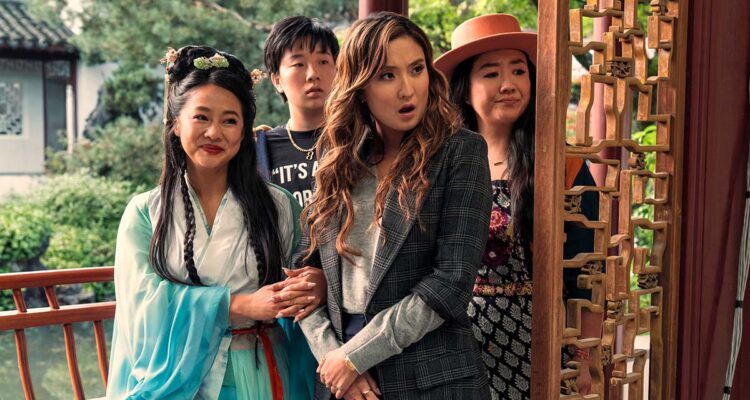When it comes to R-rated comedies, no other film festival can hold a candle to SXSW. The Austin-based film festival is often the jumping-off point for some of the year’s highest-profile comedies; previous premieres have included films like “Knocked Up,” “21 Jump Street,” “Keanu,” and the work-in-progress debut of “Bridesmaids.” This means a stop at SXSW is an absolute no-brainer for any film resulting from the Judd Apatow producing tree. So it’s no surprise to see Adele Lim’s “Joy Ride” become the latest movie to try to take the festival by storm.
READ MORE: SXSW 2023 Preview: 25 Must-See Film & TV Projects To Watch
As the only two Asian-American kids in a suburban Washington community, Audrey (Ashley Park) and Lolo (Sherry Cola) were destined to become friends. That friendship carries them through to their very different adulthoods, where Audrey has become a prominent lawyer at a local law firm, and Lolo, ever the starving artist, crashes in her guest house. When Audrey is tasked with closing an important Chinese contract, she jumps at the chance to travel with Lolo and visit her college roommate Kat (Stephanie Hsu), a rising television star.
But in her desire to make partner, Audrey has somewhat overstated her familiarity with the Chinese market. She is adopted — her parents are White — and speaks no Mandarin, relying heavily on her friends to help her navigate local customs. So when the group is unexpectedly joined by Deadeye (Sabrina Wu), Lolo’s awkward cousin, the four friends hatch a wild scheme to reconnect Audrey with her birth mother in an attempt to impress her client. Soon the four embark on a cross-country road trip that involves cocaine, Baron Davis, and more than a few uncomfortable truths.
Modern comedy is often defined by dialogue. One of the hallmarks of Apatow-style movies is their emphasis on improvisation; you put talented performers onscreen together and let them find the best version of the joke at the moment. And for the first twenty minutes, “Joy Ride” appears to be another acceptable example of unscripted comedy. There’s nothing inherently wrong with that, mind you — there are plenty of funny movies rooted in characters talking shit to each other — but as with any Hollywood trend, seeing something again and again eventually leads to diminishing returns.
Thankfully, director Adele Lim understands the visual potential of humor as well. From the moment the group of friends set foot on a cross-country train — and run into a drug smuggling American who threatens them into helping her, ah, hide her stash — “Joy Ride” switches into a higher gear. An increased emphasis on structure and editing enhances the jokey dialogue between the film’s stars. Between prolonged sex scenes and even the occasional musical number (!), Lim and company demonstrate intentionality with the material that keeps it one step ahead of audience expectations.
And that kind of thoughtfulness is essential because “Joy Ride” is trying to do more with its material than many of its peers. The film’s crux is Audrey’s struggles to reconcile her Chinese and American heritage while holding onto friendships that bridge those worlds. Both Lolo and Kat are bilingual and have strong familial ties to China, but Audrey often feels like an interloper, forced to wait for conversations to be translated or cultural touchpoints to be explained. How “Joy Ride” navigates Audrey’s identity is one of the film’s highlights, and the script is full of jokes and set pieces rooted in these kinds of cultural specificities without punching down.
The film’s true highlight is Deadeye, Sabrina Wu’s character. On paper, Deadeye’s arc should be less impactful than that of the other characters — Deadeye is learning to make essential human connections, not navigate major life events — but Wu’s identity as a nonbinary actor adds richness to the role. While Audrey may struggle to connect to both sides of her Asian-American heritage, Deadeye also has to navigate the gender norms placed on them by their family. It may never approach this material with a heavy hand, but “Joy Ride” takes an intersectional approach to the material that is refreshing to find onscreen.
(Plus, Deadeye’s obsession with K-pop allows the film to make great use of both Park’s and Hsu’s backgrounds in Broadway musicals. If you are going to introduce a deus ex machina into your movie, choosing BTS ARMY — who have proven themselves as modern miracle workers in the past — is a pretty reasonable way to go.)
Even when “Joy Ride” makes the expected shift from comedy to more heartfelt beats about family and the importance of culture, it feels more like a progression of the story and not a departure from the preceding material. When the characters fight, their frustrations with each other feel more complicated — though no less resolvable — than their comedy peers. There may not be any real surprises in how the final act shakes out, but we judge films like “Joy Ride” on their ability to play with convention, not avoid it. Oh, and it also doesn’t hurt that the movie puts some of the most important educational moments in the hands of a celebrity guest star that will make any television fans of a certain age very, very happy.
Ultimately, “Joy Ride” is equal parts comedy and preparation. Those looking for a raunchy comedy about vagina tattoos and non-Parisian Eiffel Towers will get their fill (and then some), but Lim’s film also proves beyond a shadow of a doubt that concepts of race and ethnicity in no way limit modern comedy. What movies like “Joy Ride” require is effort — a willingness to think about the impact of the material, to develop your jokes, and to find the humor as filmmakers as much as performers. Sometimes, you have to be really smart to be really stupid, and “Joy Ride” threads that needle with aplomb. [B+]
Follow along for all our reviews and coverage of the 2023 SXSW Film & Television Festival.

